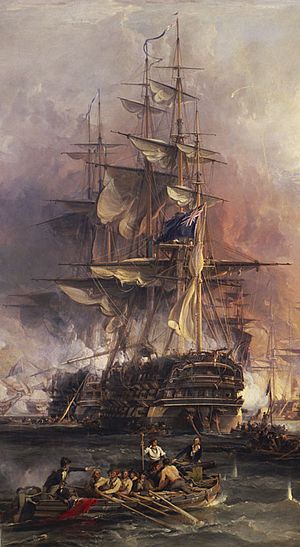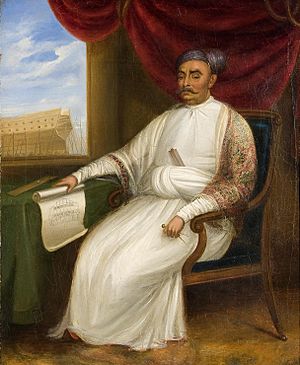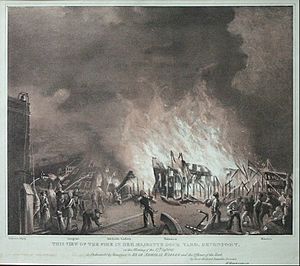HMS Minden (1810) facts for kids
class="infobox " style="float: right; clear: right; width: 315px; border-spacing: 2px; text-align: left; font-size: 90%;"
| colspan="2" style="text-align: center; font-size: 90%; line-height: 1.5em;" | 
|} HMS Minden was a large Royal Navy warship. It had 74 guns and was called a 'ship of the line'. This means it was powerful enough to fight in the main battle line. The ship was launched on June 19, 1810, in Bombay, which was then part of India. It was named after the German town of Minden. A big battle, the Battle of Minden, happened there in 1759. In that battle, British and Prussian forces won against France during the Seven Years' War.
Contents
| History | |
|---|---|
| Name | HMS Minden |
| Ordered | 9 July 1801 |
| Builder | Wadia Group |
| Launched | 19 June 1810 |
| Honours and awards |
|
| Fate | Sold for breaking up, 1861 |
| Notes | Hulked, 1842 |
| General characteristics | |
| Class and type | Ganges-class ship of the line |
| Tons burthen | 1721 bm |
| Length | 169 ft 6 in (51.66 m) (gundeck) |
| Beam | 47 ft 8+1⁄2 in (14.5 m) |
| Depth of hold | 20 ft 3 in (6.17 m) |
| Propulsion | Sails |
| Sail plan | Full-rigged ship |
| Armament |
|
Building the Minden
The Minden was built by Jamsetjee Bomanjee Wadia from the Wadia Group. He was a famous shipbuilder. The ship was launched from the Duncan Docks in Bombay, India. It was made from strong teak wood.
People at the time were very proud of the Minden. A newspaper, the Bombay Courier, wrote about its launch in 1810. It said the Minden was the first British ship of its size built outside of Great Britain. The newspaper also said the ship was beautiful and very strong. Many experts thought it was as good as any warship built in the best shipyards in Great Britain. This showed how skilled the builders in Bombay were.
Early Journeys and Battles
The Minden began its first journey on February 8, 1811. It sailed from Bombay under Captain Edward Wallis Hoare. In March, the ship went from Madras to join the invasion of Java. Java was an island then controlled by Dutch and French forces.
The Marrack Fort Attack
On July 29, 1811, two small boats from the Minden attacked a fort. This fort protected the harbor of Marrack, near Batavia (now Jakarta). Only 35 officers and men, led by Lieutenant Edmund Lyons, took part. They bravely captured the fort. Years later, in 1848, a special medal was given to the survivors of this action. The Dutch and French forces in Java gave up in September.
After this, the Minden sailed to the United Kingdom. It also helped protect other ships traveling to places like the East Indies, the Cape of Good Hope, South America, and Africa.
Service in the East Indies
In August 1812, the Minden sailed from Portsmouth to Madras, India. It arrived in January 1813 and became the main ship for Vice Admiral Sir Samuel Hood. He was the commander of the British navy in the East Indies Station. The ship had several captains during this time.
Admiral Hood traveled on the Minden to the eastern parts of his station in 1814. He visited Semarang, Java, and later returned to Madras. Admiral Hood sadly passed away in Madras in December 1814. The Minden stayed in the East Indies until September 1815, returning to England in February 1816.
The War of 1812 Myth
You might read online that the Minden was involved in the War of 1812 in America. Some stories even say that Francis Scott Key was on board when he wrote "The Star-Spangled Banner". However, these claims are not true. The ship's records show it was in the East Indies during that time, as explained above.
The Bombardment of Algiers
In July 1816, the Minden sailed from Plymouth Sound. It was part of a combined British and Dutch fleet. This fleet launched a big attack on Algiers on August 27, 1816. The goal was to stop pirates and free Christian slaves. This was a fierce battle, and a special medal was later given to the survivors.
After Algiers, the Minden sailed back to the East Indies. It was reported to be in Trincomalee in 1819.
Later Years and New Roles
In July 1830, the Minden was in Plymouth, England. It was recommissioned in March 1836 and sailed to the Tagus River to join the British squadron there. By 1839, it was in Malta, returning to Plymouth in early 1840.
The Devonport Dockyard Fire
The Minden was at Devonport dockyard when a huge fire broke out on September 25, 1840. The fire started on another ship, HMS Talavera, which was completely destroyed. The flames spread to the Minden, but luckily, the fire on board was put out. The fire also damaged nearby buildings and equipment.
Hospital Ship in Hong Kong
A powerful typhoon hit Hong Kong on July 22, 1841. It destroyed the Royal Naval Hospital on shore. Because of this, the Minden was prepared in December 1841 to become a hospital ship.
From 1842, the Minden served as a floating hospital in Hong Kong. It helped care for sick and injured sailors. In 1846, another ship, HMS Alligator, took over its role as a hospital ship. The Minden then became a stores ship, holding supplies for the navy. It stayed in Hong Kong until August 1861, when it was sold and taken apart.
Legacy in Hong Kong
Even today, the Minden's name lives on in Hong Kong. Two streets in Tsim Sha Tsui, Kowloon, are named after the ship: Minden Row and Minden Avenue. They are located behind Signal Hill.
 | Ernest Everett Just |
 | Mary Jackson |
 | Emmett Chappelle |
 | Marie Maynard Daly |



